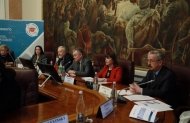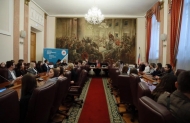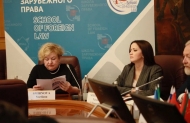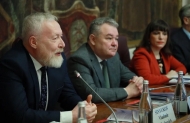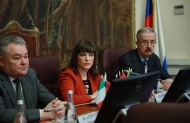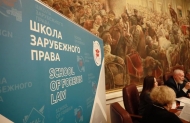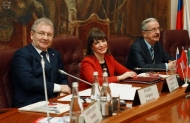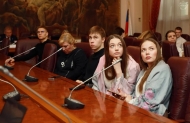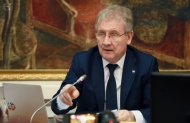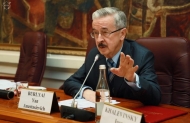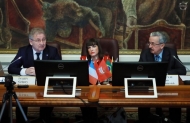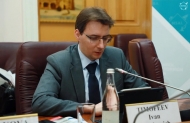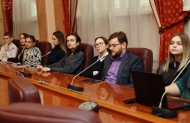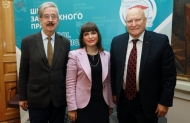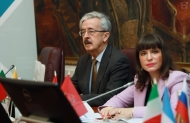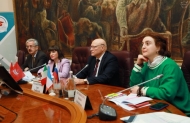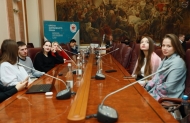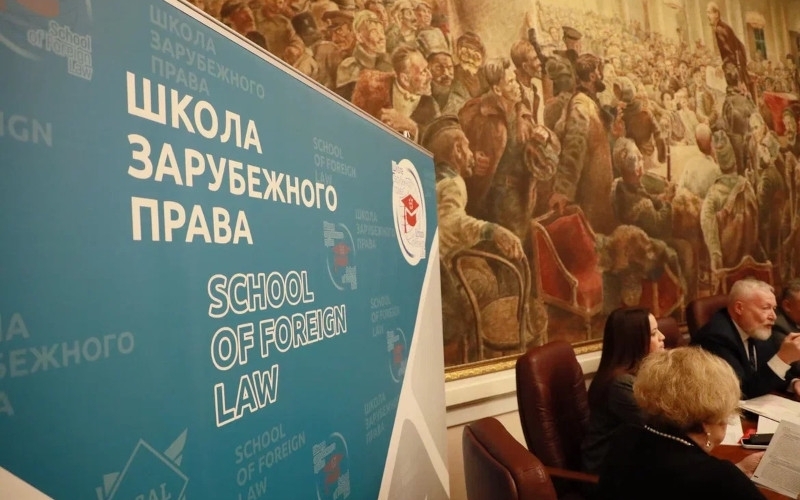
On January 18-19, 2023, the III Winter Online School of Foreign Law was held at MSLA. Topic - "Law, economics and politics in the context of digitalization."
The event was opened by the Rector of the Moscow State Law University named after O.E. Kutafina (MGYuA), Professor, Honored Lawyer of the Russian Federation, Co-Chairman of the Association of Lawyers of Russia Viktor Vladimirovich BLAZHEEV.
Welcoming addresses to the participants of the school were also addressed by:
- Vice-Rector for Research Activities of the Moscow State Law University named after O.E. Kutafin (MGYuA), Doctor of Law, Professor Vladimir Nikolaevich SINYUKOV;
- Vice-Rector for Educational Activities of the Moscow State Law University named after O.E. Kutafina (MGYuA), candidate of legal sciences, associate professor Natalya Viktorovna SOFIYCHUK;
- Member of the Supreme Advisory Council of the Eurasian Peoples' Assembly, Chairman of the Association of Russian Diplomats of the Ministry of Foreign Affairs of Russia, Candidate of Economic Sciences Igor Vasilievich KHALEVINSKY;
- Director of the Center for Iberoamerican Programs of the Moscow State Linguistic University, Professor, Ambassador Extraordinary and Plenipotentiary Yan Anastasyevich BURLYAI;
- Chairman of the Council of the Assembly of Peoples of Russia, First Deputy Secretary General - Head of the General Secretariat of the Eurasian Peoples' Assembly, Doctor of Political Sciences, Professor Svetlana Konstantinovna SMIRNOVA;
- Head of the School, Chairman of the Commission on International Affairs and Scientific Cooperation of the Moscow Branch of the Association of Lawyers of Russia, Co-President of the International Union of Lawyers and Economists of France, Assistant to the Vice-Rector for Research, Professor of the Department of Competition Law of the Moscow State Law University named after O.E. Kutafina (MGYuA), Doctor of Law, Professor Maria Aleksandrovna EGOROVA.
More than 170 students from France, Italy, Brazil, Russia, India, China, Tajikistan and Belarus listened to lectures by leading scientists and practitioners from Europe and Asia. There were 17 speakers representing foreign and Russian universities and organizations: China University of Political Science and Law (CUPL, China), Beijing Agricultural University (China), Frederick II University of Naples (Italy), Federal University of the State of Rio de Janeiro (Brazil ), Manipal University in Jaipur (India), Central University of South Bihar (India), University of Santiago de Compostela (Spain), University of Catania (Italy), European Institute of Political, Economic and Social Studies (Italy), Eurasian Patent Office, Russian International Affairs Council, Moscow State Linguistic University.
The main speakers of the School, in particular, were: Head of the Eurasian Patent Office Grigory Ivlev, Program Director of the Russian International Affairs Council (RIAC) Ivan Timofeev, Director of the Center for Iberoamerican Programs of the Moscow State Linguistic University, Professor, Ambassador Extraordinary and Plenipotentiary Yan Burlyai, Secretary General of the European Institute of Political, Economic and Social Studies (Italy) Marco Richeri, Professor, Director of the Center for International Law, Director of the Office for International Cooperation and Exchange of the China University of Political Science and Law (CUPL, China) Li Jiuqian, Dean of the Center for Legal and Political Sciences of the Federal University of Rio State de Janeiro (UNIRIO, Brazil) Edna Raquel Hoghemann and others.
The topic of the first day is "Law, Politics and Economics: Mutual Influence in Globalizing International Relations".
One of the trends in the development of society in the 21st century is the transformation of the world under the influence of the information revolution, characterized by great dynamics, the emergence of new subjects of international relations and the formation of a new social space that has a significant impact on the world economy and politics. Digital technologies and law are transforming the role and functions of public and international institutions (states, international organizations, political parties, etc.), causing an increasing mutual influence of law, economics and politics. All areas of international relations are undergoing a qualitative change, from the process of making political decisions to international conflicts.
In this regard, the first day of the Winter Online School is devoted to the question of the role of international law in ensuring economic and political ties in the modern world; the answer to this question is of particular importance in the context of growing tensions in international relations, changes in the geopolitical situation and the global economic and energy crisis.
The theme of the second day is "The importance of information technology in law for the modern economic and political life of society."
In recent years, information technologies (IT) used in the economic and political life of society have evolved significantly under the influence of economic, social, cultural and political processes, requiring huge human, time and financial resources of the state, as well as effective tools for their implementation, one of which is the law appears.
In politics, IT is used to collect, store, process and transmit information and disseminate it in order to ensure mass participation of citizens in political decision-making, increase the availability of knowledge about political processes, ensure the possibility of conveying opinions to government institutions and obtaining information by the authorities about the opinions and requests of the population.
IT plays an equally important role in the economic life of society, where they act as an effective tool for making economically important decisions, providing additional opportunities for predicting economically important results and allowing to make an informed management decision. A necessary condition for the use of such technologies in both economics and politics is the existence of a legal framework, which was discussed on the second day of the Winter Online School.
For reference
School of Foreign Law of the University named after O.E. Kutafin (MGYuA) is a new scientific and educational project aimed at developing international scientific activity and aimed at undergraduate, specialist and master's students studying law at Russian and foreign universities.
The goals of the School of Foreign Law of the University named after O.E. Kutafin (MGYuA) are:
- improving the quality of knowledge of various branches of law among Russian and foreign students;
- strengthening cooperation between students, teachers and experts from Russian and foreign universities and international organizations, as well as their joint research and development of effective scientific approaches to solving existing legal problems;
- stimulating lifelong self-directed learning through the promotion of research, consulting, management and professional development services in a dynamic business environment.
The basic concept of the law school involved the creation of the first specialized legal course of lectures in the country and in the post-Soviet space, which was supposed to cover programs in legal management, business law, as well as comprehensive economic-legal and managerial-legal programs, including international ones.
The main tasks of the School of Foreign Law:
- increasing the level of knowledge about Russian and foreign legal systems;
- formation of professional skills;
- development of interaction in the educational environment of representatives of universities from different countries;
- development of skills for the implementation of an interdisciplinary approach;
- development of succession of expert experience of foreign partners;
- development of international scientific activity;
- attracting foreign experts and spreading the idea of the Russian legal school.
The School of Foreign Law is a unique opportunity to immerse yourself not only in the language environment, but also to study and discuss the most pressing issues of law. For two days, the participants listened to a course of lectures from leading experts of the O.E. Kutafin (Moscow State Law Academy), foreign universities and international organizations. Each lecture lasts 45 minutes, during which the speaker not only reveals one of the topical issues of the school, but also presents case studies to the participants for discussion.
Over the past period, the School of Foreign Law has become one of the largest centers for the additional exchange of professional and expert experience, gaining fame not only nationally, but also internationally.
The concept of the School of Foreign Law includes a division into two levels: Strategic level and International cooperation.
The strategic level of the School of Foreign Law includes a comprehensive preparation of students for the implementation of a professional expert assessment and allows to get a comprehensive idea of modern problems in the field of law in the context of global climate change, the widespread introduction of innovative technologies and the increasing relevance of security issues. The scientific discussion within the framework of the discussion of the scientific positions of the speakers of the School of Foreign Law makes it possible to form and fix new scientific ideas and approaches to solving various problems of law.
International cooperation makes it possible to prepare and create a network international training program based on the involvement of domestic experts in foreign partner universities, as well as the organization of international student and teacher exchanges and internships. Discussion of topical scientific and legal problems within research discussions and exchange of experience in comparative legal research allows young and accomplished scientists to develop and use in their activities the latest scientific approaches to solving specific, including interdisciplinary, problems.



